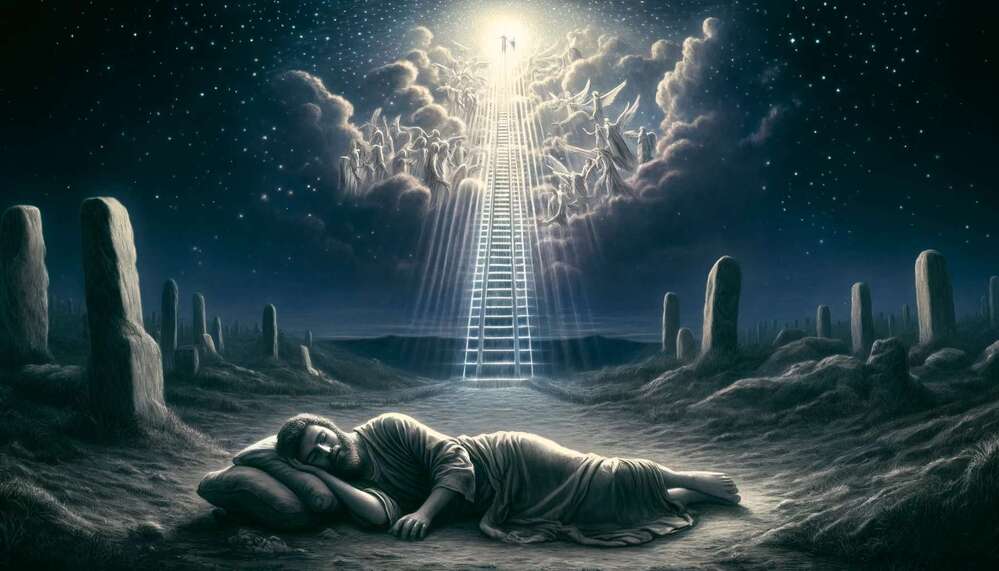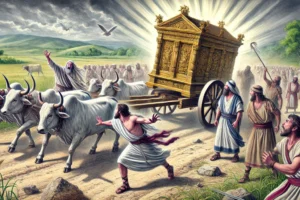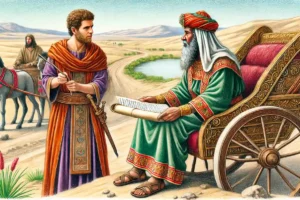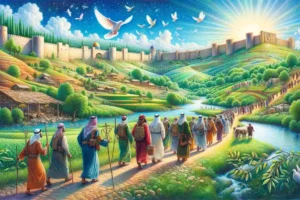
Jacob’s Ladder: Genesis 28:10-19
- Event: Jacob’s dream, known as “Jacob’s Ladder.”
- Location: Bethel, previously known as Luz.
- The Dream: Jacob sees a ladder reaching to heaven with angels ascending and descending on it.
- God’s Promise: God stands above it and reiterates the Abrahamic covenant to Jacob, promising land, numerous descendants, and blessings to all families of the earth through those descendants.
- Jacob’s Reaction: Upon waking, Jacob names the place Bethel (meaning “house of God”), declaring it the gate of heaven.
- Memorial: He sets up a stone pillar as a memorial of his encounter with God and vows to give a tenth of all he receives.
Jacob’s Ladder, as recounted in Genesis 28:10-19, is a rich narrative filled with symbolic meanings and theological implications, deeply embedded in the Abrahamic faiths’ traditions. This passage describes a critical moment in Jacob’s life, offering insight into his character, his relationship with God, and the broader covenantal promises that form a cornerstone of biblical faith.
Context and Setting
Jacob, fleeing from his brother Esau’s wrath after deceiving their father Isaac to receive the firstborn’s blessing, stops for the night in a place later named Bethel. This geographical and spiritual setting is pivotal; it represents a liminal space, a threshold between Jacob’s past actions and his future transformation.
The Dream and Its Symbolism
- The Ladder: The vision of a ladder (or stairway) reaching to heaven with angels ascending and descending symbolizes the connection between God and humanity, heaven and earth. This imagery has been interpreted to represent various concepts, including the mediation between God and man, the path to divine understanding, and the continuous interaction between the divine and the mundane.
- The Angels: Their movement up and down the ladder signifies ongoing divine activity and surveillance in the world, reassuring Jacob of God’s omnipresence and protection.
- God’s Presence: God standing above the ladder reiterates the covenant made with Abraham and Isaac, extending it to Jacob. This divine encounter underscores God’s unmerited grace towards Jacob, despite his previous deceit.
Theological Themes
- Covenant and Promise: God’s promises to Jacob echo the Abrahamic covenant, emphasizing land, offspring as numerous as the “dust of the earth,” and all families on earth being blessed through Jacob’s lineage. This not only reiterates God’s faithfulness to His promises but also sets the stage for Israel’s national identity and mission.
- Divine Presence and Protection: God assures Jacob of His presence and protection wherever he goes, a promise of enduring support that reflects God’s immanence and care for His chosen.
- Transformation and Commitment: Jacob’s response upon waking—naming the place Bethel (“house of God”) and setting up a stone pillar—marks a turning point in his spiritual journey. His vow to give a tenth of all he receives back to God signifies his commitment and the beginning of his transformation into Israel, the father of the twelve tribes.
Significance in Biblical Narrative
Jacob’s Ladder not only illustrates a personal encounter with the divine but also serves as a foundational theophany (manifestation of God) in the Hebrew Bible. It foreshadows the role of the Israelites as a bridge between God and the world, through whom the universal blessings of the covenant are to be dispensed. This narrative enriches the tapestry of biblical theology, emphasizing themes of grace, covenantal fidelity, and the pursuit of a deeper relationship with God.
In sum, Jacob’s Ladder is a multifaceted narrative that speaks to the enduring relationship between God and His people, the importance of faith and obedience, and the continuous presence of the divine in the journey of life. It encapsulates key theological concepts that resonate through the rest of the biblical text and into the lives of believers today.



